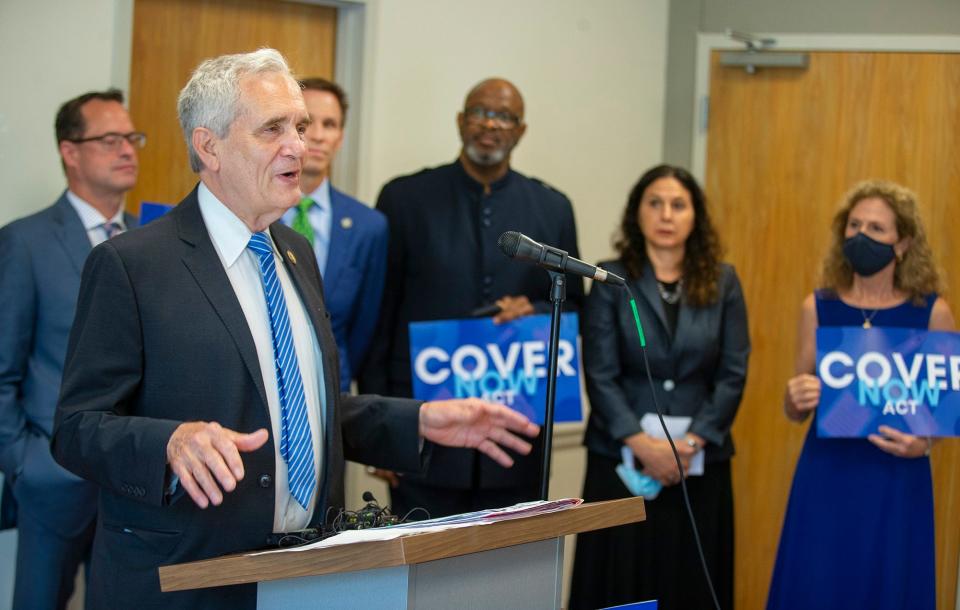What's gone wrong with Texas' Medicaid unwinding? Inside the problems with state agency.

- Oops!Something went wrong.Please try again later.
- Oops!Something went wrong.Please try again later.
Editor's note and clarification: the story has been updated to better reflect the Texas Health and Human Services Commission's explanation on what are active system issues, and its response on a vendor contract. The commission also said it's taking the full 12 months to properly verify all six million Medicaid recipients in Texas.
Jennifer Barrios remembers receiving in May a yellow envelope with the red letters "Action Required" on it.
She logged into the Texas Medicaid benefits app, which the mother of three from Donna, near McAllen, uses to submit information and to check her children's Medicaid benefits.
She said the app read "no tasks needed." Her children's benefits were good through July 25.
In June, she took 4-year-old daughter Ashlyn to the dentist only to learn that her children no longer had Medicaid, effective June 1.
Barrios is one of almost 500,000 people in Texas who have lost Medicaid coverage for what the state calls "procedural" reasons. Sometimes they are dropped because they didn't fill out the form in the envelope within 30 days. In other cases, children have been categorized incorrectly and pregnant people have been dropped erroneously.
The American-Statesman asked public policy experts at Every Texan, the Children's Defense Fund, Texans Care for Children how to improve the process and emailed whistleblowers at the Texas Health and Human Services Commission, the state agency in charge of Medicaid and the reenrollment process.
The Statesman also emailed the state commission; talked to the Centers for Medicare & Medicaid Services, the federal agency that oversees Medicaid; and U.S. Rep. Lloyd Doggett, who with fellow congressional Democrats from Texas sent a letter to CMS asking for help to oversee Texas' process.
What is the size of the reenrollment process?
In Texas, about 6 million people receive their health care via Medicaid, based on income. They are children, people with a disability, pregnant people or those within two months of giving birth. The end of the pandemic emergency in May meant that instead of automatic Medicaid reenrollment, people had to verify they still qualified for benefits.
Texas divided Medicaid recipients into three cohorts. In July, the state released the first cohort data, focused on people mostly likely to no longer qualify, and 490,723 people were denied coverage for procedural reasons, like not answering letters or submitting information in time, and 125,831 people were dropped because they are ineligible. Yet 242,717 were renewed.
Stacey Pogue, senior policy analyst at Every Texan, questioned the number of people denied for procedural reasons. She blamed system errors.
"We talk about the numbers and mechanics; it's a real human tragedy to have interruption of care," Doggett said.
Early this month, the state is expected to have numbers for the second cohort, focusing on pregnant people.
The third cohort, mainly children and people who are disabled, goes through the verification process this month.
Texas Health and Human Services has said it is working with partners to ensure the redetermination process operates smoothly.
Why is technology causing some of the problems?
The group connected to the whistleblower letters dated July 25 and Aug. 21, point to 20 "active system issues," and a need for more information technology staffing. Systems might not talk to each other or are erroneously coded to drop a qualified person. The app or website has gone down or not allowed people to upload their verification forms. Texas HHSC referred to the "active system issues" as technical issues.
Deloitte, the contractor in charge of designing the Texas Integrated Eligibility Redesign System Module, which processes information and determines eligibility; the YourTexasBenefits.com website and app for enrollees to use; the online form to apply for benefits and the worker portal to read that form, did not answer questions about system problems other than refer the Statesman back to the commission. Deloitte has a five-year, $80 million contract that ended March 31. The contract is under renewal for two, two-year extensions.
The state said the commission "has increased its development resources by 40% and added 15 support contractors."
The commission noted: "Through our quality assurance process, we’ve identified and are resolving technical issues."
There are issues that a staffer processing claims cannot fix, the whistleblower group said. The staffer files a ticket with IT, but there are delays or "a fix for some of the issues."
Solution: Take a pause.
The state has an entire year from April 1 to reverify everyone, but advocacy groups and whistle blowers say the commission has tried to do it in about half that time. "There is pressure from state leadership to do it as quickly as possible," said Diana Forester, director of health policy for Texans Care for Children. "The feeling is, 'if we unenroll people, we can always re-enroll them,' ... but that doesn't help you in the moment," she said, like when you need to take a child to the doctor.
The whistleblower group agrees with this assessment, adding that staff has been directed to finish the review process as quickly as possible to not add "to the billion dollars Medicaid shortfall."
On Friday, the commission said the six month assertion is simply not true, and it's taking the full 12 months to properly verify all six million Medicaid recipients in Texas.
"We are initiating renewals for the maintained population, or those who maintained coverage because of continuous Medicaid, within the first 6 months, but we still must redetermine the entire Medicaid population through normal renewals (about half of the Medicaid population) that will be initiated throughout the 12 months," Tiffany Young, a public information officer for the commission, told the Statesman via email.
The state could slow this process and still make the one-year deadline by pausing terminations, giving people more time to fill out the forms before they get terminated, and focus on fixing the system errors and the communications between systems.
A pause also would allow staffers to catch up on existing applications before adding another million people in the September cohort.
CMS might tell Texas to pause verifications if the process continues to be problematic.
Gov. Greg Abbott could get involved to ask for a pause. "The governor could say, 'not one more eligible child loses coverage on my watch,'" Pogue said.
The governor's office did not return a request for comment.
The whistleblower group plans to send a new letter about more problems, this one to the governor instead of the commissioner of Texas Health and Human Services.
Why isn't the state using existing databases to verify information?
Texas has the third-lowest rates of ex parte verifications of all states. This is when you use state and federal databases such as those for SNAP WIC benefits or from the Texas Workforce Commission to verify income and other personal information. In the first cohort of people, only about 20,000 were verified through the ex parte process.
The state said that in the first cohort "it is to be expected that those individuals' renewals could not be verified on an ex parte basis. ... We anticipate our ex parte rate to increase," said Tiffany Young, Health and Human Services public information officer.
Solution: "Texas could do a better job accessing information they already have," said Graciela Camarena, child health outreach program director for Children's Defense Fund.
Why not give more time for people to verify information?
Federal law requires that recipients get at least 30 days to respond to notices and provide the required information. Texas could have allowed more days, but went with the minimum of 30. "We chose the strictest way to implement things," Forester said.
Solution: Texas recently received permission from CMS to give "certain Medicaid recipients" 30 more days to complete their renewal packets.
"No one knows how this will be implemented as we are told we have limited system resources, the change may not take place in time to prevent denials," the whistleblower group said.
Why not make it easier to upload forms, even if dropped from Medicaid?
People are denied and locked out of the system before they can submit all their documents. If they miss that 30-day, or now possibly 60-day, window, or they forget to send every document needed or to fill out all the information, they can't go back into their account. They then have to go to their local benefits office or fax the information instead of being able to submit it on the Your Texas Benefits app or website.
Solution: People should be able to continue to submit forms and information via the app and website during the 90-day reconsideration period after their coverage has ended.
Medicaid unwinding: Texas Democrats send letter to federal agency over state dropping people from Medicaid

Why are multiple applications and conflicting information happening?
If you call 211 after your benefits lapsed, often you'll be told to reapply with a new form. In reality, you have 90 days to supply the information needed. You should not submit a new application.
The state said 76% of Medicaid applications were processed within the federal standard of 45 days from the receipt of applications; the average was 30 days at July's end. The whistleblowers said the time is 75 days.
Solution: People need clear and accurate messaging at all points, be it by mail, email, text or 211.
Forester said if people can accurately see their renewal dates on the website.
Recipients need the agency to upload verification information. People currently must wait until they get the yellow envelope or an electronic request before they can upload their information.

Investigating a broken system: How a Statesman investigation unearthed a problem in Medicaid
What can people do to stay covered?
The state and experts recommend:
You should respond quickly to any information you receive from the state, especially the yellow envelope. If you haven't received a renewal packet, submit a renewal online at yourtexasbenefits.com, obtain a paper form at a local office or contact 211, Option 2.
Have documentation, recent pay stubs, immigration papers, Social Security cards, children's birth certificates.
Update personal information at yourtexasbenefits.com, including address and phone number.
Visit local benefits office, community groups like Central Texas Food Bank or clinics such as CommUnityCare, Lone Star Circle of Care and People's Community Clinic for help.
Apply for prior Medicaid coverage by filling out an Application for Prior Medicaid Coverage to pay bills up to three months old if you were unenrolled or denied.
Call your doctor's office to verify coverage.
Stick with it.
Barrios submitted a new application after speaking with 211. She had coverage reinstated July 22, but the state left off Ashlyn, 4. Her siblings, Catelyn, 7, Giancarlo, 9, are covered.
A few days into the school year, Ashlyn caught strep and went to a doctor. Barrios had to pay out of pocket for the doctor's visit and the antibiotics.
Barrios has been calling regularly to get Ashlyn covered. Her case has been escalated, but Ashlyn still doesn't have coverage.
"I have no clue why they left her out," she said of Ashlyn.
How to stay insured: Is my child going to lose Medicaid? What families need to do now to avoid being dropped
This article originally appeared on Austin American-Statesman: Inside the problems with Medicaid unwinding in Texas. What to know.

